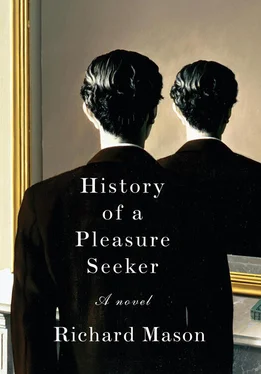“I don’t think so, Mrs. de Leeuw.”
“Very well. I do hope you’ll be comfortable here.”
When she had gone, Piet sat on his bed and loosened his tie. He was half alarmed by the suddenness of the change he had wrought in his fortunes. Gone at a stroke was the tiny alcove, separated by a curtain from his father’s room, in which he had slept since leaving his cradle. Gone was the outside toilet, the rusting plumbing, the vile university food to which he and Herman had become accustomed since his mother’s death. The ambitions he had nursed so privately — of travel and comfort and elegance, of escaping forever the straitened gentility of his youth — were plausible now, seized from the realm of fantasy by his own determination to act on his instincts. To have a room of his own at last! To be able to bathe without laying a fire and boiling the water; to shit without shivering in the little wooden hut beside the back door! He started to laugh as the nervous energy of the afternoon drained from him. He felt light and triumphant, capable of anything.
There was a knock at the door. It was Didier Loubat, the footman, with a pile of shirts and collars and a little box of studs. He was taller than Piet and blond, with a strong jaw and sharp sea-green eyes. “The old man wants to see you in forty-five minutes. His office is at the front of the house, on the first floor. D’you want me to come and get you, or will you find it on your own?”
“I’ll find it.”
“Good man. The whole family’s gathering to vet you at dinner. Bonne chance .” Didier’s friendliness was a relief after Mrs. de Leeuw’s chilly formality. “My room’s next door if you need anything, and the bathroom’s down the hall. A little tip: don’t let Blok see you in a towel. He’s a terrible old lecher.”
“I thought he might be.”
Didier grinned. “You need your wits about you in this house, but you’ll get used to it. There’s a towel in the cupboard.”
The towel in the cupboard was of vast size and fresh-smelling fluffiness. Piet took it with him to the bathroom, which was tiled in white porcelain and deliciously clean. In the corner was an eight-foot bath, and when he turned the tap the suddenness with which boiling water gushed from it took him by surprise and scalded him. That such quantities of hot water could be obtained so effortlessly was miraculous to him. He filled the tub very full and undressed and got in and stretched back at full length, baptizing himself in his new life. He would cable to his father tomorrow, but Herman had never shown much concern for his whereabouts and Piet doubted that his absence tonight would alarm him. He lay in the hot water, feeling very pleased with himself, but as it cooled so did his triumph and the complexities of his new situation stole in and replaced it.
Piet had sufficient experience of female unpredictability to know the risks of forming a liaison with his new employer’s wife. As he washed, he decided that he would never again allude to the unspoken communications of the afternoon. Emigration to America and the making of a considerable fortune were the next stage of his plan. He would take no chances until he had saved the money to fund them. He submerged himself again, and it came to him that his efforts with Mrs. Vermeulen-Sickerts had left him in a powerful negotiating position with her husband. The salary advertised was sixty guilders a month. It was clear from the establishment at Herengracht 605 that the man who owned it could afford considerably more. Piet got out of the bath and began to dry himself. Unless he was very much mistaken, Jacobina would make sure he was employed whatever the salary. His experience of wealthy undergraduates had shown him that many rich men prefer to pay more, rather than less, on the grounds that quality is closely correlated with expense.
He dressed slowly and carefully, and by the time he was finished he had decided to add a further challenge to the many he had risen to that day.
He had decided to ask for more.
The office of Maarten Vermeulen-Sickerts was protected from disturbance by a small anteroom. Piet knocked twice at its door before gathering the courage to pull the rope of twisted vermilion silk that rang a bell above Maarten’s desk. He heard its far-off tinkle, then vigorous steps, and then his new employer stood before him: a powerfully built, square-shouldered man with a full head of hair, silver at the temples, a prominent nose, and small dark eyes that bored so deeply into him he almost lost his nerve.
“My wife speaks very warmly of you, Mr. Barol.” He gripped Piet’s hand with a force that made many men wince. Piet did not wince. Maarten gestured for him to enter a handsomely proportioned room, papered in lemon yellow and cluttered with objects in silver, crystal, and gilt.
“You are a collector, sir.”
“When I have the time. Sit down, if you please.”
Piet sat on a chair made of dark wood, upholstered in pale blue and gold.
“That was made for the palace of Louis Napoleon, when he was king of Holland. This one is from the Palace of Fontainebleu.” He sat down on it emphatically. “I enjoy fine furniture. But I’m also fond of china and porcelain and silver, anything that is made by hand and of rare quality. I value human endeavor, Mr. Barol, and the achievements our machine age cannot hope to emulate.”
“We have something in common there, sir.”
“Indeed?”
“I have less opportunity to pursue my interests, and of course I cannot buy. But I like to draw objects of beauty. There are several fine collections in Leiden. I have spent many wet afternoons sketching them.”
“You draw well?”
“Tolerably well, sir.”
“Would you be kind enough to draw something for me? Something in here.”
Maarten was a man who believed in putting the claims of other men to the test, and his wife’s enthusiastic commendation of the handsome young chap before him made him rather wish to find fault with Piet Barol. He went to his desk and returned with a miniature silver model of a man on a tightrope, balancing precariously. “Eighteenth century Dutch. Let me get you some paper, Mr. Barol.”
The detailing on the miniature was extremely fine. The way the man was about to fall off his rope, and yet never would, seemed to Piet to speak to his own situation. Indeed, it was precisely this quality that had persuaded Maarten Vermeulen-Sickerts to part with one hundred guilders for it twenty years before — when such a sum was meaningful to him. Like Piet he was accustomed to putting himself in dangerous situations and emerging from them unscathed. It was he, after all, who had seen the potential in his neighbor’s barren farms, he who had sunk everything he had into purchasing the equipment to dig up their peat bogs, transport the fuel to Amsterdam, and refill them as lakes that froze in the winter. This had provided the raw material for his first fortune, built on selling ice around the world. Quite 30 percent of his first cargo had melted on its way across the Atlantic to the convenience-obsessed shores of the United States. Everyone had said he was a fool; that it would never work. And yet it had worked. Like the little silver man teetering on the silver rope, high above the silver plate that bore his weight, he had not fallen off.
Piet succeeded in capturing the miniature with such skill, and so quickly, that Maarten was impressed despite himself. He did not show this but embarked instead on a detailed examination of Piet’s history, which lasted longer than it would have done had his wife not already decided to hire him. But she had, and Maarten did not disagree with the women in his life if he could help it. Piet’s was not the most distinguished record he had ever seen, but Egbert’s last two tutors had been highly distinguished and had nevertheless failed utterly.
Читать дальше












